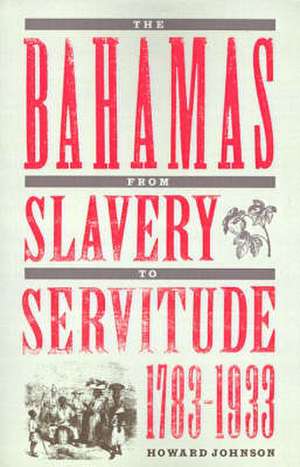The Bahamas from Slavery to Servitude, 1783-1933
Autor Howard Johnsonen Limba Engleză Hardback – 31 ian 1997
| Toate formatele și edițiile | Preț | Express |
|---|---|---|
| Paperback (1) | 182.84 lei 43-57 zile | |
| University Press of Florida – 31 dec 1995 | 182.84 lei 43-57 zile | |
| Hardback (1) | 394.35 lei 43-57 zile | |
| University Press of Florida – 31 ian 1997 | 394.35 lei 43-57 zile |
Preț: 394.35 lei
Nou
Puncte Express: 592
Preț estimativ în valută:
75.46€ • 78.100$ • 62.44£
75.46€ • 78.100$ • 62.44£
Carte tipărită la comandă
Livrare economică 07-21 aprilie
Preluare comenzi: 021 569.72.76
Specificații
ISBN-13: 9780813014944
ISBN-10: 0813014948
Pagini: 240
Dimensiuni: 161 x 237 x 23 mm
Greutate: 0.56 kg
Ediția:New.
Editura: University Press of Florida
ISBN-10: 0813014948
Pagini: 240
Dimensiuni: 161 x 237 x 23 mm
Greutate: 0.56 kg
Ediția:New.
Editura: University Press of Florida
Textul de pe ultima copertă
In the only scholarly treatment of Bahamian socio-economic history in post-emancipation years, Johnson begins by examining the last phase of slavery as one element in the foundation of later, and often more exploitative, labor systems. Looking at both urban and rural slave populations, Johnson discusses the systems of slave hire, apprenticeship, and indenture and highlights the ways in which the people of the Bahamas formed a proto-peasantry, often exerting more autonomy and power as slaves than as a "free" people. Following emancipation in 1838, export economies of cotton, salt, sponges, and pineapples spawned coercive credit and truck systems, which bolstered the dominance of a white mercantile elite that would exercise control until the early 1960s. Various government policies further perpetuated a "machinery of class slavery", making migration (primarily to Key West, and later to Miami) one of the few escape routes available to the lower classes. Throughout, Johnson relates historical movements and events in the Bahamas to those in neighboring Caribbean islands, Latin America, and the United States, making this an important source book for all Caribbeanists. It will also be of interest to scholars of the historiography of slavery in the Americas and the transition from slavery to freedom - or, in a post-emancipation system of domination like that of the Bahamas - from slavery to servitude.
Descriere
Descriere de la o altă ediție sau format:
"A significant contribution to the history of the Caribbean and to the comparative study of slavery and transitions to free labor systems" (Nigel O. Bolland, Colgate University), this book "shifts the focus of interest from the islands' elites to the common people...with special reference to the black populations" (Richard Sheridan, University of Kansas at Lawrence).
"A significant contribution to the history of the Caribbean and to the comparative study of slavery and transitions to free labor systems" (Nigel O. Bolland, Colgate University), this book "shifts the focus of interest from the islands' elites to the common people...with special reference to the black populations" (Richard Sheridan, University of Kansas at Lawrence).















